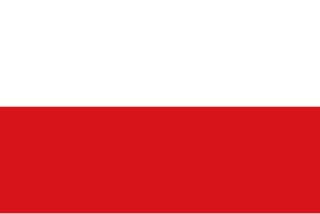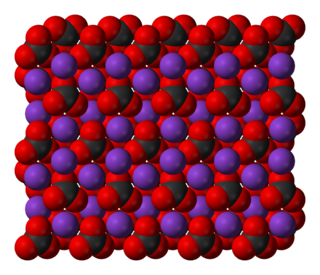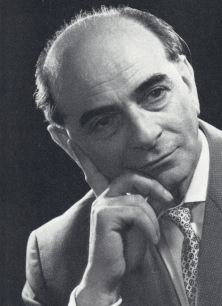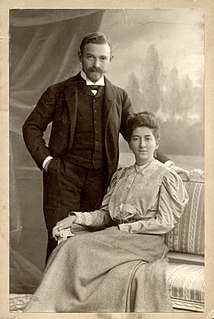Albert Popper (Czech : Vojtěch Popper; Hebrew name: Abraham ; 1808 – 3 September 1889) was a mayor of Vimperk (Winterberg) and doctor for the House of Schwarzenberg.

Czech, historically also Bohemian, is a West Slavic language of the Czech–Slovak group. Spoken by over 10 million people, it serves as the official language of the Czech Republic. Czech is closely related to Slovak, to the point of mutual intelligibility to a very high degree. Like other Slavic languages, Czech is a fusional language with a rich system of morphology and relatively flexible word order. Its vocabulary has been extensively influenced by Latin and German.
Hebrew names are names that have a Hebrew language origin, classically from the Hebrew Bible. They are mostly used by Jews and Christians, but many are also adapted to the Islamic world, particularly if a Hebrew name is mentioned in the Qur'an. A typical Hebrew name can have many different forms, having been adapted to the phonologies of many different languages. A common Jewish practice worldwide is to give a Hebrew name to a child that is used religiously throughout his or her lifetime.

Abraham, originally Abram, is the common patriarch of the three Abrahamic religions. In Judaism, he is the founding father of the Covenant, the special relationship between the Jewish people and God; in Christianity, he is the prototype of all believers, Jewish or Gentile; and in Islam he is seen as a link in the chain of prophets that begins with Adam and culminates in Muhammad.
Popper was born in the village of Bresnitz (Březnice) to a Jewish family. At the time of his birth the number of Jewish families in the Kingdom of Bohemia was strictly controlled by the Familianten quota system, which was partially abolished in 1848 and fully abolished in 1859.

Březnice is a town in the Central Bohemian Region of the Czech Republic. It has around 3,700 inhabitants.

The Kingdom of Bohemia, sometimes in English literature referred to as the Czech Kingdom, was a medieval and early modern monarchy in Central Europe, the predecessor of the modern Czech Republic. It was an Imperial State in the Holy Roman Empire, and the Bohemian king was a prince-elector of the empire. The kings of Bohemia, besides Bohemia, also ruled the Lands of the Bohemian Crown, which at various times included Moravia, Silesia, Lusatia, and parts of Saxony, Brandenburg, and Bavaria.
Familianten or Familianten Gesetz was the German term commonly used for the laws and the related record books which regulated the number of Jewish families in the Czech lands in the 18th and 19th centuries.
In addition to the government control of Jewish procreation, during most of Popper's life Jews were prohibited from owning property, choosing their place of domicile, attending public schools, or holding public office. This situation did not change until late in Albert Popper's life with the reforms of 1867 in the Austrian portion of the dual monarchy.

Cisleithania was a common yet unofficial denotation of the northern and western part of Austria-Hungary, the Dual Monarchy created in the Compromise of 1867—as distinguished from Transleithania, i.e. the Hungarian Lands of the Crown of Saint Stephen east of ("beyond") the Leitha River.
Popper, nevertheless, was able to gain permission to attend the University of Vienna, where he earned his doctorate in Pharmacology in 1835. [1] He went on to earn his medical degree and settled in Vimperk where he established a pharmacy and served as the official doctor to the Schwarzenberg princes. [2] [3] [4] [5]

The University of Vienna is a public university located in Vienna, Austria. It was founded by Duke Rudolph IV in 1365 and is the oldest university in the German-speaking world. With its long and rich history, the University of Vienna has developed into one of the largest universities in Europe, and also one of the most renowned, especially in the Humanities. It is associated with 20 Nobel prize winners and has been the academic home to a large number of scholars of historical as well as of academic importance.

Pharmacology is the branch of biology concerned with the study of drug action, where a drug can be broadly defined as any man-made, natural, or endogenous molecule which exerts a biochemical or physiological effect on the cell, tissue, organ, or organism. More specifically, it is the study of the interactions that occur between a living organism and chemicals that affect normal or abnormal biochemical function. If substances have medicinal properties, they are considered pharmaceuticals.
In 1841, Popper published a treatment for Chlorosis (Hypochromic anemia) containing Vitriolum martis (sulfuric acid and iron) and Sal tartari (potassium carbonate) in Österreichische medicinische Wochenschrift which was republished and refined in the following years. [6] [7] [8] [9] [10]
Hypochromic anemia, or Hypochromic anaemia, is a generic term for any type of anemia in which the red blood cells (erythrocytes) are paler than normal. A normal red blood cell will have an area of pallor in the center of it; it is biconcave disk shaped. In hypochromic cells, this area of central pallor is increased. This decrease in redness is due to a disproportionate reduction of red cell hemoglobin in proportion to the volume of the cell. Clinically the color can be evaluated by the Mean Corpuscular Hemoglobin (MCH) or Mean Corpuscular Hemoglobin Concentration (MCHC). The MCHC is considered the better parameter of the two as it adjusts for effect the size of the cell has on its color. Hypochromia is clinically defined as below the normal MCH reference range of 27-33 picograms/cell in adults or below the normal MCHC reference range of 33-36 g/dL in adults.

Sulfuric acid (alternative spelling sulphuric acid), also known as vitriol, is a mineral acid composed of the elements sulfur, oxygen and hydrogen, with molecular formula H2SO4. It is a colorless, odorless, and syrupy liquid that is soluble in water, in a reaction that is highly exothermic.

Potassium carbonate is the inorganic compound with the formula K2CO3. It is a white salt, which is soluble in water. It is deliquescent, often appearing a damp or wet solid. Potassium carbonate is mainly used in the production of soap and glass.
By the time of the Vimperk fire of 1857, Popper was the town's mayor. After the fire, he implored the Habsburg monarchy for assistance. Emperor Franz Joseph himself came to Vimperk and was the guest of Albert Popper. The emperor agreed to provide imperial funds for repair and reconstruction.










